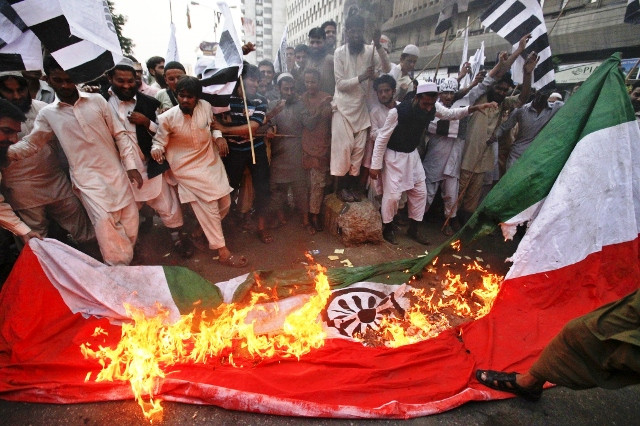Media commentator Aakar Patel, who also co-owns a publishing and content outsource company in Mumbai, recently wrote for The Express Tribune about the Kashmir freedom struggle and how India gets away despite its reign of oppression and coercion in the valley. For a change, Aakar is one of the voices from the Indian mainstream who infuses fresh life into the waning secular Indianess.
However, his skewed proclamations where he raises questions like "What does azadi mean? It means freedom, of course. But freedom from what? (sic)", which are not new to the Kashmir discourse, stink of ignorance and self-righteousness, and must be rebutted.
Aakar wrote that Kashmir freedom struggle evokes less or no sympathy from the western nations because of its religiosity. To put it bluntly, he sought to blame Islam for being a roadblock in the Kashmir freedom struggle whose intended goal is to achieve separation from India. Here one would like to ask Aakar whether he is trying to suggest that had the majority of Kashmiris been uncircumcised monks in monasteries, the west would have considered the struggle secular enough to damn India for its brutality. How does he know?
Aakar's obsession with the west and its model of “democracy” notwithstanding, which he aspires to follow studiously, he conveniently overlooks the fact that the west looks upon India as a booming market where it can sell its armaments and technology. India, the largest importer of arms in the world, is planning to enhance its stockpile by buying $100 billion worth of new weapons over the next 10 years. US, Israel and Europe are its major arms suppliers. Did Aakar even consider this? With what supremeness of logic does he expect the western countries to raise the issue of Kashmir with India and cut the hands that feed their economies?
Western nations aren't concerned or don't talk about human rights violations committed by security forces in Kashmir specifically because they don't want to lose a lucrative market. If the non-Islamism of a freedom struggle was a factor for bringing conflicts into the focus of the west, why hasn't the western media paid attention to the Maoist conflict that has bled the heart of India? Why was the conflict in Sri Lanka not paid any attention by the west? Apart from the sloppy noises, why doesn't Tibet come under the radar of the west's so-called morality dictating authorities? These questions Aakar doesn’t care to answer because they will raise more uncomfortable questions. Also, the western media doesn't cover Kashmir with proper concern and continuance because it doesn't want to meet the fate of The Economist!
Aakar also asks what is wrong with the Indian constitution. "It is not utopian, but it works," he claims.
"Kashmir’s leaders who demand azadi from India’s constitution should explain why they are rejecting it".
There are two points that will answer this question. One, that the Indian constitution works (and he is honest enough to admit that it works partially) doesn't necessarily mean that the people on which it is enforced have no option but to go with the will of the majority and accept it. One evil doesn't necessarily give moral superiority to the other, lesser evil.
Two, his partiality in addressing this issue raises crucial questions that lie at the heart of a raging debate on whether India is a secular democracy where all the citizens are treated as equals or whether India, as a soft fascist state, is prejudiced towards its large minority in times of duress and crisis, as has happened across the India where Muslims have been systematically targeted by the state agencies, particularly in cases of terrorism. The answers to these questions are anyone’s guess!
When it comes to the effectiveness of justice delivery institutions, nothing can explain the flaws of Indian constitution more than the fateful women of the Kunan Poshpora village who are waiting, even after 21 years of having been allegedly raped by security forces, to see their perpetrators punished.
How can one explain the greatness of Indian constitution to them? How can one convince the mother of Sameer Rah who was trampled under the boots of the “world’s largest democracy” or to the 5,000 odd families who wait for their victims of enforced disappearances to return home safely to believe in the greatness of Indian constitution? What about the 3,000 odd half-widows who battle against hope to see their missing husbands come back from oblivion? What reprieve has the Indian constitution offered them?
It was a year after the partition of subcontinent when the Indian republic was yet to come into existence that the Indian prime minister, acknowledging the disputed nature of the Kashmir issue, took it to the United Nations. Now Mr Patel wants that Indian constitution to be shoved down the throats of Kashmiris if they don’t accept it. Had Aakar verified the facts, he would have known that Kashmiris have never cherished the rights granted by the “close-to-utopia” Indian constitution like the people living in India.
Kashmiris challenge the applicability of the Indian constitution in the valley precisely because it neither works in Kashmir nor does it provide the fruits of its greatness to the people the way it does to people living in India. For the last 22 years, the state has been held hostage by draconian laws like the Armed Forces Special Powers Act under which thousands of people have been killed and subjected to enforced disappearances. Why should Kashmiris even consider examining the flaws of Indian constitution when it is nothing more than a source of torments for them?
The western nations particularly the USA have used the human rights issue to exercise its leverage over lesser blessed countries where it sniffs opportunities that can be utilised and useful resources that can be exploited. If only human suffering was enough to evoke sympathies of the west, we would have found NATO troops camping in Sierra Leone or Sudan instead of Libya and Afghanistan. They don’t come to save your humanity. They come to save their economies - their nations.
Why America won't help with Kashmir
Aaker Patel thinks that Kashmir evokes less sympathy from the west because of its religiosity, but I beg to differ.



COMMENTS
Comments are moderated and generally will be posted if they are on-topic and not abusive.
For more information, please see our Comments FAQ